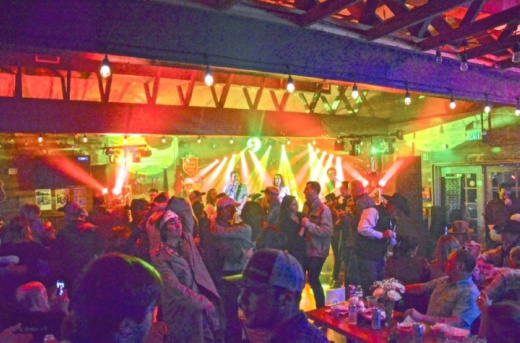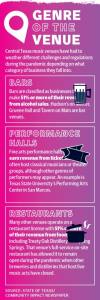“It’s like looking in a crystal ball. It’s all foggy,” she said.
Hays County issued a stay-at-home order due to COVID-19 on March 26, requiring nonessential businesses, including bars and other venues, to close. The four months since have held twists and turns for the local music community. Texas allowed bars to open and host music acts again in late May only to shutter them before the July 4 weekend as local and state case counts shot back up. Meanwhile, large event halls and arenas have put on shows where masked concert-goers sit 6 feet apart.
A survey conducted in April by the National Independent Venue Association reported 90% of independent venues across the country are likely to close by fall if conditions persist. The challenges venues face are not identical, but local industry professionals agree creative approaches will be needed to weather the pandemic.
“We’ve got lots of sweet little venues in Hays County. I’ve been watching them drop like flies in Austin, and I just hope, hope, hope, as do my artists, that they aren’t all gone at the end of this,” Renfro said.
Virtual to reality
While venues were closed in the spring, many turned to livestreaming to keep support for local artists and venues strong.
“People were ready to get the music back in their souls somehow, and we were able to do that with streaming,” said Clay Hudson, co-owner of Hudson’s on Mercer in Dripping Springs.
During Treaty Oak Distillery’s eight-part “Quaranstream” series, as many as 1,000 viewers tuned in per event, and big Texas names such as Ray Wylie Hubbard participated.
"There was no twisting of any arms to come on board and help us out,” Treaty Oak co-owner Nate Powell said. “They definitely have satisfaction in being able to, even just for an hour, connect with their fan base.”
Hudson’s success with streaming dwindled as the pandemic drew out longer than expected, however.
“We still try to keep a livestream going to have some sort of income for the musicians that are always there for us,” co-owner Natasha Hudson said. “But unfortunately, that’s kind of slowed down.”
Venues saw varying success reopening with socially distanced shows at limited capacities in May and June. While some venues, such as Tavern on Main, found it impossible to accommodate state and local social distancing restrictions, some roomier facilities found their footing. Southwest Austin’s Nutty Brown Amphitheatre held its first shows in June, and regional hub for major acts Dell Diamond made its first attempt with a Fourth of July concert that brought in around 2,600 guests—15% of its 17,500 capacity—just after Gov. Greg Abbott issued a statewide mask mandate.
“What we were really depending on was the fans coming out, being responsible, and they did,” said JJ Gottsch, director of R3 Sports & Entertainment, which works with Dell Diamond and other Central Texas venues.
Treaty Oak, meanwhile, discovered its 26 acres of space was a boon in the new landscape of live music.
“It’s kind of the sky’s the limit with what we can do with that space,” Powell said. “We’re at a crossroads: how do we settle into a business model that works for us and also gives people what they’re starving for right now?”
Powell said he and his partners are considering options to host larger-scale events than many other venues have the space to accommodate, including drive-in concerts and distanced picnic table rentals for shows.
Small venues struggle
In addition to struggling with space constraints, smaller, locally owned venues in Central Texas, such as Tavern on Main, have faced heightened challenges during the pandemic in terms of closures and limited business operations since many are classified as bars. In Texas, any business that makes 51% or more of its revenue from alcohol sales is classified as a bar.
“My passion is the music side, and the beverage side of it pretty much pays the bills, and the food side of it balances everything out,” Renfro said. “There’s a whole category beyond restaurants and bars that follows the same trends.”
Some venues are experiencing heightened difficulty in this second closure as landlords become less lenient with rent and stimulus payments dry up. Renfro, for instance, had to open in June despite her concerns about coronavirus case counts in order to make up the month’s rent she had just paid.
When bars were again forced to close later in June, some, including Buda venue Buck’s Backyard, attempted to finagle higher food sales or find loopholes to allow consumption of to-go alcohol on patios, to little avail.
“We were doing good for the one month we were open. We even had a big show and lots of people turned out, and then we had to close down just a week after that show,” Buck’s Backyard owner Robert Badger said.
Some large venues have been legally required to close as well since Texas restored county governments’ rights to issue stay-at-home orders in early July. Whitewater Amphitheatre has remained closed due to Comal County’s order, eliminating a popular destination for Central Texans and beyond. Whitewater owner Will Korioth said he does not expect the opportunity to hold a full-capacity show until at least Memorial Day of 2021.
“It kind of looks pretty dismal for anything to happen this year, as far as I can tell,” Korioth said.
For some, financial pressure and uncertainty over whether the status quo will return has already proven too much. In Austin, a number of iconic venues have closed permanently during the pandemic, including Barracuda, Plush and Threadgill’s final location. A study conducted by the University of Houston on behalf of the Austin Chamber of Commerce in July reported 62% of Austin-area music venues expected to be closed within four months if pandemic conditions were prolonged.
Keeping the legacy of live music alive is vital in Austin and throughout Central Texas, Gottsch said.
“At its core, Austin has always been known as the ‘Live Music Capital of the World,’” Gottsch said. “I really think this entire [metro], from Georgetown all the way down to New Braunfels, is a part of that.”
That cultural impact is also inseparable from the region’s identity as a tourist destination and a local economic driver. Whitewater’s closure alone for the 2020 tourist season—Memorial Day to Labor Day—means a $60 million loss for the New Braunfels/Canyon Lake area, Korioth said.
Losses from canceled Austin festivals, including the Austin City Limits Music Festival, have a similarly profound regional impact, said Reenie Collins, Health Alliance for Austin Musicians executive director.
“We drive a large part of this economy,” Collins said. “When people come to town, they’re coming in part because there’s so much to do in Austin, and that includes a very vibrant venue music and bar scene.”•Creative solutions
Despite trudging through months of profound uncertainty, many venue owners say they are not ready to throw in the towel.
“We’re not ever going to give up, but it is very hard to know at this time if it is ever going to fully recover. But we are not going to go down easy; that’s for sure,” Natasha Hudson said.
Gottsch said what it will take for venues large and small to make it through is adaptability.
“The conversations that we’re having with artists, managers, and booking agents are completely different than we’ve had in the past 20 years,” Gottsch said. “Folks are now having to get really creative.”
Renfro said she is facing her own crossroads of creativity. To reopen and create the revenue she needs for Tavern on Main to survive, she said she will have to reimagine her business model, emphasizing the food coming out of her kitchen.
“My choice is either to just give up the ghost, go out of business, turn over my lease back to my landlord and let him put somebody else in there who’s going to do something different, or to hang in, scrounge, do something,” she said. “I’m trying to figure out what I can do to just limp through. But maybe I won’t limp through. Maybe I’ll thrive.”







